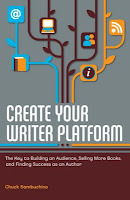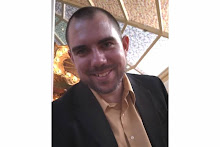One of my favorite things for 2012 was the life-changing moments series of guest posts in which readers shared a moment that changed their lives--and how even in the seemingly worst situations they found a lesson that helped them move forward. I'm excited to share an entire series of moments from Amanda M. Socci.
Amanda is a freelance writer and blogger from Alexandria, Virginia, who writes posts on her personal blog (http://creativeideagal.com), blogs entries on a book on faith which she is blogging on a local news service (http://mountvernon.patch.com - search for "Socci"), and searching for freelance writing assignments. Amanda enjoys taking unusual viewpoints in her nonfiction writing, incorporating meaningful analysis with hints of humor, along with references to pop culture. A diehard researcher and natural observer of life, Amanda writes about diverse topics, hoping to entertain her readers through unique perspectives on life.
-->
 |
| Amanda M. Socci |
Did you ever experience a time in your life when you felt
that you were meant to be doing something and ended up ignoring that feeling,
only to let that feeling get stronger?
I did. I felt a
calling to write early on in my life but chose to ignore that calling several
times. Each time I felt the calling, the
urge to write got stronger and it became harder to ignore. One day, the calling shoved me up against a
brick wall like a violent wake-up call. I
finally answered my calling.
After 30 years of messing around in dead-end career choices,
I finally got down to business and unflinchingly declared myself a writer at
the ripe age of 40. What follows is a
chronological sequence of events leading up to the pivotal moment where my life
changed. These are the moments where I ignored the calling in my life, which,
as I have come to realize, is writing.
This is my story.
Age 10: Reading lots
of Books
My writing career began surreptitiously with a foundation in
reading. Just a babe at 10 years old, I borrowed
lots of books from our library, loving getting lost in the teenybopper romance
stories. I learned about an author who
was published at the age of 13 and became obsessed with being a published
author. From that moment, I put an
unnecessary amount of pressure on myself to be published by the age of 13.
As much as I wanted to write, the pressure of copying
someone else’s success of publishing a perfectly written book by the age of 13
was more than I could handle. Too much
planning in the brain led to indecision and no real writing.
This would be the first time in my life that I ignored my
calling.
Age 13: Being
Different is Hard
When I was 13, I was your typical 8th grader from
New Jersey, sporting big hair and neon clothes, ogling over the hotties in
Duran Duran. As typical as I appeared to
the outside world, I was not typical on the inside. I was depressed and had thoughts of suicide
because I was so different than everyone else and not accepted for who I was.
I became an ostracized square peg living among attractive
white people. Back in the 1980s, my
hometown in rural New Jersey was 95% white, with only 5% minority, including
African Americans and us, Latinos. My
parents and grandparents were the ones born in Colombia, South America while
two siblings and I were born in the United States. That didn’t stop the cruel illegal alien and
immigrant jokes from invading our breathing space.
I went to a Catholic school and dutifully learned my Catholic
teachings,
practically to a fault.
I excelled at school when I failed at
relationships.
I buried my nose in the schoolbooks
and in reading.
Out of pain came a love
for fiction.
My own invented fiction.
Born Amanda M. Castro, I took on a pen name “Chantal Pearcy”
as a derivative of my name in French class “Chantal” and the last name of my
favorite singer “Stephen Pearcy” from the heavy metal rock band, RATT. Once I took up that pen name, everything was
in my power.
I was no longer the helpless Amanda who cried because she
was teased, taunted, and humiliated for being a Latina, for having acne, for
liking the color red, or for any other ridiculous reason. I became the dark and moody Penny Marshall, adeptly
directing my characters on paper, killing off some characters, resurrecting
others.
I also wrote letters to God, asking him why he was being so
unfair to me. I ended up writing a
lot. I loved the satisfying experience
of writing and creating. I relished every second of it.
Age 15: Things Start
to Turn Around
By age 15, I was a sophomore in high school. With my life still in turmoil over personal
issues, I dove headfirst into my schoolwork as well as my writing, which gave
me a cool sword of smarts and writing chops.
I created a novella which I was very proud of. I submitted a draft to my favorite English
teacher, who promptly dismissed it with a polite “thank you” and a few
grammatical fixes, but without any substantive feedback.
My junior year in high school became a turning point in my
writing career, dare I say, prophetic. I
read Bram Stoker’s Dracula, which I thought was exceptional, and had a homework
assignment to write an essay describing the symbolism in Dracula. Using my own analysis and creativity, I wrote
some pretty decent descriptions of the characters with an impressive masthead
that resembled what you’d see in a playbill.
After I turned in my assignment, my English teacher demanded
to know how I came up with my description of the main characters. I calmly explained that I invented everything
out of my own imagination. Would you believe that I was borderline accused of
plagiarism? Strangely, I didn’t mind the
controversy and silently smirked at myself, happy that my writing could cause
such a ruckus in small-town, New Jersey.
Such a strong reaction to my writing meant I was on to
something. Was God calling me to write
for a living? I was only 16 years old
when I felt the calling so vividly. Was writing the thing I was meant to do for
the rest of my life?
My parents had always been supportive of my eccentricities,
but they weren’t too keen on my getting into writing as a profession because,
as my father rationalized, in order to be a writer, I would have to write every
day. That wasn’t something I was willing
to commit to because my writing happened only when inspired. If I wasn’t inspired, I could not bring
myself to write. Let’s just say that by
convincing myself that I couldn’t write as a result of a perceived lack of
inspiration, I succeeded and was not able to write.
Since I refused to write every day, my junior year in high
school would be the second time in my life that I ignored my calling.
Age 19: Recycling
Moves into my Heart
In 1991, I was an impressionable 19 year-old who had been
shielded from many life experiences and was anything but street smart. I headed to the progressive, forward-thinking
college of Rutgers University in New Brunswick, New Jersey, where I first fell
in love with the concept of recycling.
Before I even knew who Ed Begley, Jr. was, I became him, trying to
convince my professors to recycle, with very little time or interest in writing
professionally.
I took several writing-centered classes but refused to get
an English minor degree because I couldn’t stomach Shakespeare. Instead, I shifted gears altogether and
became fascinated with crime and the psychology behind the crime. I took so many classes supporting the science
of crimes, that I changed my major and graduated proudly with a Bachelor of
Science degree in the administration of justice. I was headed to law school.
How does one go from being depressed, to writing as an
outlet for dealing with emotions, to a sudden interest in crimes en route to
law school? Easy. Some innocent comments from my parents made
the difference. My parents prodded me
to try my hand at law because they said I was good at starting debates with my
brothers and always looking to get the last word in.
Age 23: Law School
Beckons
In late August 1995, I received rejections from all the law
schools that I applied to. I was stuck and didn’t know what to do. After some more prodding from my father and a
10-page persuasive, heart-written, detailed letter made its way to the dean’s
desk, I earned a coveted spot at Howard University School of Law in Washington,
D.C., despite having bombed the LSATs and dropped my grades while in college.
Being in law school certainly made me smarter, but it also
kicked me in the butt and made me sweat.
I will never forget how the first week of law school had me reading law
cases, like complicated short stories for geniuses, and spending just about eight
hours of intensive studying to understand them.
The next three years had me writing legal briefs and legal
research papers, which I loved, because I was reintroduced to the mechanics of writing
while at law school. But this writing
was different. I couldn’t just invent
what I wanted. I had to support every
one of my statements with thorough legal research of past legal cases (legal
precedent) that tackled the same subject matter of the original question or
problem. It was excruciatingly complex
and not fun at all.
Nonetheless, I was thoroughly excited to use my new legal
research and writing skills to produce strong writing once again. By this time, my interests were now in
consumer affairs, and I seemed to be enthralled with the bureaucracy of business,
all while proudly writing about it.
After graduating from law school, I got married and was very
happy spiritually, but physically, I was burned out. I took some time off from the intensity of
law school and turned to couponing before the concept of extreme couponing became
commonplace.
I was the original extreme couponer, hoarding multiple
coupon inserts, hitting our local supermarkets and getting tons of free
stuff. A far cry from burning the
midnight oil and straining my eyesight in reading hundreds of legal cases, I
finally felt free again to be myself, but did nothing professionally.
Age 26: Answering the
Call with a Huge Writing Project
After doing so much couponing, I became inspired. Why not write about my good deals in a way
that is funny, interesting, and informative?
The inspiration took over me and rained down a million funky thoughts,
eventually turning them into “Consumers Everywhere,” a national publication for
consumers that was quirky, cute, and promoted unusual themes in each issue.
Although no one ever regarded “Consumers Everywhere” as
special, I absolutely loved it because I did it all by myself without any
help. Plus, it marks the first time in
my life that I felt that familiar calling and actually did something about it.
Despite the calling, however, reality set in and in my new
marriage, I knew I had to do my part to help my husband bring home the
bacon. I gave up writing and looked for
full-time work, in any field, so long as it paid the bills. Complete strangers admonished me for not
getting into the legal field after having graduated law school. Little did they know how many years I would
try to get into the legal field with no success. That made me 0 for 2. No career in law, no
career in writing.
...to be continued.
*****
The conclusion of this story will post next Friday.
In the meantime, feel free to check out some other Life-Changing Moments stories from 2012:



